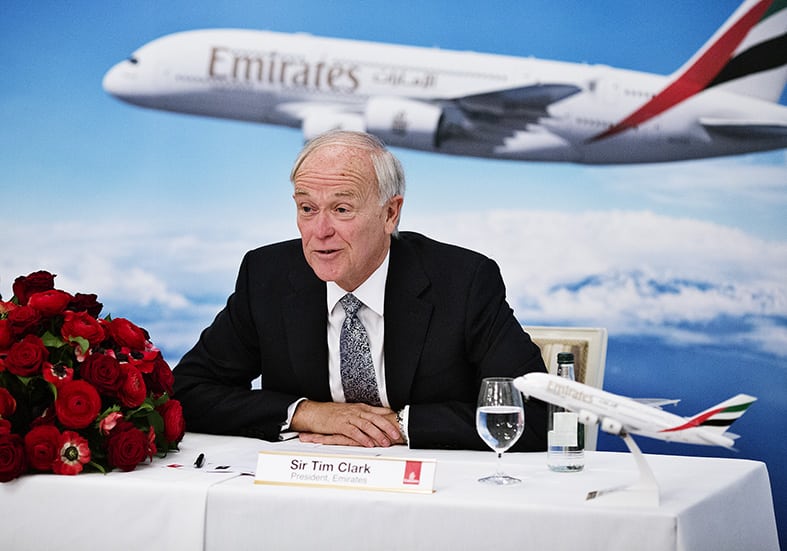Skift Take
It's really difficult to find Clark unprepared or off his game. The big three U.S. Airlines and the EU Transport Commission will have to get up pretty early in the morning to beat his arguments--not just because of the time difference with the UAE, either.
During a press conference at the Hotel d’Angleterre in Copenhagen, to announce Emirates Airlines’ first launch of A380 service in Scandinavia through a collaboration with Copenhagen International Airport, Tim Clark answered questions on the escalating disagreements over Open Skies in the US and support for the big three U.S. airlines involved in the dispute by the EU Transport Commissioner Violeta Bulc.
The President and CEO of the largest of the Gulf carriers—and the largest operator of A380 aircraft in the world—described reports submitted by the big three U.S. carriers as part of their argument against U.S.-UAE Open Skies agreements as a “wholly spurious, fallacious, [and] malicious.”
Dubious Unanimity
Responding to Skift on the EU Transport Commissioner’s support for the big three carriers’ Open Skies claims, Clark referenced Emirates’ contributions to Europe, its close relationship with sovereign European States–including Denmark–and said the position of the EU Transport Commissioner is based on a false assumption that the whole of the 28 EU Member States share this point of view.
“It presupposes a degree of unanimity with regard to the thinking of the 28 states in the EU, and that the thoughts of the commission are fully representative [of those States]. I’m not sure they are.” He referred to the bilateral air service agreement between the UAE and Denmark as “a sovereign instrument,” between two countries which determines “what goes on in terms of air service.”
Denmark, Clark points out, is not the only EU State to have such a strong and independent bond with its UAE partner. “We have the same with the United Kingdom. We have the same with the Netherlands. We have the same with the Poles and the Czechs, the Austrians, the Hungarians, I could name them all. They are free and open agreements and they are representative of a group-think moving away from the pre-determinism of the Jurassic era—of the 1950s, ’60s, ’70s and ’80s.”
To Clark, “The constraint and spirit of anything alternative to trying to get trade between countries in the openness of the Global economy of today is complete nonsense.”
Of the EU Transport Commissioner’s recent expression of support for U.S. carriers’ objections to the Gulf Carrier’s Open Skies policies, Clark told us: “Why they should listen to what has come out of the United States, the three carriers producing a wholly spurious, salacious, malicious report about what we do; and that they should pay lip service to that worries me.
“Can we deal with it? Yes. Will we deal with it? Yes.
“Because I believe that Emirates has been a thoroughly good thing for Europe in many ways—not just flying passengers. It’s quite important that we create the wealth that we create. I do not believe that the European Union, when it gets down to it, will start saying: ‘this is not on, we must restrict.’ No. I don’t believe that. I can tell you absolutely fairly and squarely that the degree of unanimity with regard to what is apparently coming out of the [EU Transport Commission] is not there.”
Clark credited Copenhagen International Airport for its commitment to meet Emirates’ needs for expansion by investing to accommodate the largest commercial aircraft in the world. When asked by a Danish political reporter about fair treatment of employees, Clark painted a picture of a positive, employee-focused, labor environment at Emirates.
Employee Relations
“Emirates has always tried to do the right thing by its employees. We don’t have unions in the Emirates and people say: ‘aren’t you lucky’ or ‘that’s unfair’ and all that sort of thing. But we have 22,000 cabin crew. They come from every country on the planet. If we treated them badly, if we didn’t provide them the kind of work conditions that they would want, they would simply leave.”
Clark added, “You have to make absolutely sure that what you do is the right thing, and that you keep them. So, working conditions are very important. We may not start very high—I make no secret of that—and I hope that we reward them appropriately. But we give them a fair deal.”
It is not only cabin crew who get a fair deal Clark said, but so do Emirates’ engineers “the highest paid in the world” and pilots who “receive a very good income.” Clark also said Emirates’ employees enjoy a profit sharing program—“we share the loot”—specifying that after stockholders receive their dividends “almost 50% again is given to staff as a bonus. There aren’t many companies—certainly airline companies as they’re not famous for their profitability—which actually do that.”
Clark also pointed out the numerous perks in health services, free housing, free education and other benefits which Emirates’ employees enjoy.
“In a customer-facing business, like Emirates, which tries to differentiate itself, the people who differentiate are the staff that are in that front-end.” Describing himself as “the biggest shop steward in the business” Clark said he makes it his business to ensure that Emirates’ employees are happy enough to stay.
“We could not operate our airline. Bearing in mind that 90% of all the employees in the Emirates Group, which is 70,000, are expatriates—if they don’t like it, they won’t come or they’ll go home,” he said.
The Daily Newsletter
Our daily coverage of the global travel industry. Written by editors and analysts from across Skift’s brands.
Have a confidential tip for Skift? Get in touch
Tags: open skies
Photo credit: Sir Tim Clark, President and CEO of Emirates speaking to the Press in Copenhagen. Emirates Airlines
